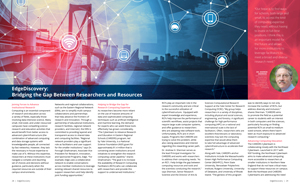Joining Forces to Advance Institutional Research
Computing is an essential component of research and education across a variety of fields, especially those involving data-intensive science. Many small, mid-sized, and under-resourced campuses have compelling science research and education activities that would benefit from better access to advanced cyberinfrastructure (the combination of advanced computing and data storage systems with knowledgeable people, all connected by fast networks). However, they lack the necessary in-house expertise to make use of it. Without this expertise, researchers at these institutions must navigate a complex and daunting set of choices and decisions without guidance, particularly when the required resources are outside of their campus environments.
Networks and regional collaborations, such as the Eastern Regional Network (ERN), aim to simplify multi-campus collaborations and partnerships that help advance the frontiers of research and innovation. Through a partnership of educational institutions, research facilities, regional network providers, and Internet2, the ERN is committed to providing layered and transparent access to shared data and computing facilities. “Regional network providers play a significant role as facilitators and user support for the smaller institutions,” says Dr. Forough Ghahramani, Associate Vice President for Research, Innovation, and Sponsored Programs, Edge. “For example, Edge uses a collaborative network to enable conversations across member institutions to leverage existing relevant shared resources to support researchers and help identify joint funding opportunities.”
Helping to Bridge the Gap for Research Computing Expertise
As researchers become more reliant on the use of massive amounts of data and sophisticated computing techniques such as artificial intelligence and machine learning, the demand for experts who can wield these tools effectively has grown considerably. “The Cyberteam to Advance Research and Education in Eastern Regional Schools (CAREERS) program, led by Yale University, is a National Science Foundation (NSF) grant for approximately $1.4 million that is convening seven institutions around initiatives to strengthen the research computing career pipeline,” shares Ghahramani. “The goal is to increase the availability of Research Computing Facilitators (RCFs) who can collaborate with researchers and provide this support to underserved institutions.”
RCFs play an important role in the research community and are critical to the successful utilization of cyberinfrastructure. Equipped with expert knowledge and experience, RCFs help improve the performance of scientific workflows, assist projects that require large scale computer systems, and offer guidance to researchers who are adopting new software tools. Unfortunately, RCFs are in short supply. Programs like CAREERS are trying to solve this problem, while also raising awareness and interest regarding this rewarding career path.
Dr. Andrew H. Sherman serves as the lead Principal Investigator for CAREERS and works with researchers to address their computing needs. “As an RCF, I help bridge the gap between computing resources and tools and the scientists conducting the research,” says Sherman, Senior Research Scientist and the Director of Arts & Sciences Computational Research Support at the Yale Center for Research Computing (YCRC). “My group helps researchers in a variety of disciplines, including physical and social sciences, engineering, and forestry. A significant challenge for high-performance computing (HPC) on a national and international scale is the lack of facilitators. Often, researchers who are excellent theoreticians or laboratory scientists may lack the computing expertise that would allow them to take full advantage of advanced cyberinfrastructure to accelerate their research.”
Along with Yale, CAREER’s anchor institutions include the Massachusetts Green High Performance Computing Center (MGHPCC), Penn State University, Rensselaer Polytechnic Institute, Rutgers University, University of Delaware, and University of Rhode Island. “The genesis of this program was to identify ways to not only increase the number of RCFs, but address diversity and inclusion,” shares Sherman. “CAREERS aims to promote the field as a potential career to students with an interest in both computers and the sciences, particularly focusing on finding potential RCFs at small-to-medium sized schools, where there hasn’t been as much exposure to advanced research computing.”
“Our hope is to find ways for schools, both large and small, to access the kind of computing expertise they need, without having to invest in full-time positions. I think this is an important model for the future and allows for more institutions to leverage facilitators to meet a broad and diverse research need.”
– Dr. Andrew Sherman

Advancing Computing Education
The CAREERS Cyberteam is collaborating closely with the Northeast Cyberteam. Launched in 2017 with NSF funding, the Northeast Cyberteam aims to make advanced computing more accessible to researchers at smaller institutions in Northern New England that do not have critical mass to support these resources on campus. Both the Northeast and CAREERS Cyberteams are addressing the need for qualified support staff by building a pool of RCFs and a process by which they can be shared across institutional boundaries. “The regional networks—for example Edge in New Jersey—can advance the missions of programs such as the Northeast and CAREERS Cyberteams in at least two ways. First, they can raise awareness among their member institutions of local, regional, and national research computing resources, including not only high performance computing centers, but also organizations like the Cyberteams that provide training, mentoring, and consultation. And, second, they can help identify research projects at smaller, less research- oriented institutions that may benefit from the Cyberteams’ activities,” explains Sherman.
Anchored by MGHPCC, University of New Hampshire, University of Maine, and University of Vermont, the Northeast Cyberteam is working to advance academic research and create new opportunities for students and faculty. “When we started to make computing resources available to research and education programs outside of the MHGPCC consortium, we quickly found that a key ingredient for success was the research computing facilitators who bridge the space between the scientists and the technology. The Northeast Cyberteam has proven to be a very effective way to meet that need,” shared John Goodhue, the Principal Investigator for the Northeast Cyberteam and Executive Director of MGHPCC. The MGHPCC is a data center and consortium that serves more than 20,000 researchers, students, and educators at Boston University, Harvard University, MIT, Northeastern University, the University of Massachusetts, and other institutions in the Northeast. “The Northeast Cyberteam launched forty-two projects over the last three years at small and medium sized institutions in northern New England,” shares Julie Ma, Program Manager, Northeast and CAREERS Cyberteams. “For each of these projects, we found a student facilitator to pair with a researcher that had a problem that needed to be solved. Students do not necessarily need to be versed in the particular domain. Instead, a mentor with domain expertise is paired with the student to provide subject matter expertise and also model how to be an effective facilitator. We want students to be able to jump between domains and learn how to use their computational expertise to help move the science forward.” Through this process, the student will learn to be an advisor to help the researcher understand what computational resources are available and how to use these tools on their project.
“Students can train to be a facilitator at a small institution, but pair with a mentor at one of the MGHPCC or anchor institutions,” says Ma. “The mentor will help the student learn about the domain science, as well as teach them the skills needed in the RCF profession. Like CAREERS, our mission also included an emphasis on increasing diversity, equity, and inclusion, by recruiting students with diverse backgrounds.” Leveraging the Northeast Cyberteam’s model for giving students hands-on RCF experience, CAREERS is pairing RCFs with students to offer guidance in effectively working and communicating with their researchers. “In the beginning, student facilitators do not have all the information they need,” says Sherman. “The mentor role brings in people who are professional RCFs from the anchor institutions and pairs them with students working on research projects. The students not only help the researcher advance their research projects, but they also learn about advanced computing and hopefully get excited about the field—later becoming RCFs themselves.”
Along with the Northeast Cyberteam, CAREERS is working to develop a network of RCFs of varying specialties throughout universities in the region, creating a comprehensive and cost-effective RCF program for a large network of institutions. “Our hope is to find ways for schools, both large and small, to access the kind of computing expertise they need, without having to invest in full-time positions,” says Sherman. “I think this is an important model for the future and allows for more institutions to leverage facilitators to meet a broad and diverse research need.”
“We wanted to expand our portal to support groups like CAREERS, and simultaneously grow the network of mentors that were registered in the portal,” says Ma. “As a result, the Northeast Cyberteam also invited other cyberteams from the NSF-funded Campus Cyberinfrastructure (CC*) program to use the platform as a management tool for their related programs.”
– Julie Ma

Increasing Access to Cyberinfrastructure Resources
As part of their operations, the Northeast Cyberteam built the Cyberteam Portal to help keep track of project workflows, and all the facilitators and their associated expertise and skillset. In spring 2020, the Northeast Cyberteam Steering Committee came to a realization that the portal could be a useful tool to connect other groups with similar goals. “We wanted to expand our portal to support groups like CAREERS, and simultaneously grow the network of mentors that were registered in the portal,” says Ma. “As a result, the Northeast Cyberteam also invited other cyberteams from the NSF-funded Campus Cyberinfrastructure (CC*) program to use the platform as a management tool for their related programs. In July 2020, we rolled out a pilot program where seven cyberteams, each with a personalized view into the database, began to explore the use of the portal to manage their workflows, while building a common network of mentors that stretches across the country. We recently added the Campus Champions community of practice to the mix, and added features to support affinity groups which connect individuals throughout the community with common goals and objectives.”
Moving forward, the Northeast Cyberteam is working to make the expanded portal, now dubbed Connect.Cyberinfrastructure.org, available to other members of the research computing community.
Supporting Inclusion and Equity
Building upon the success of the NSF-funded Internet2 Broadening the Reach: A Cyberinfrastructure Program for Non-Research-Intensive and Established Program to Stimulate Competitive Research (EPSCoR) Institutions, the ERN has formed a Broadening the Reach (BTR) working group, co-led by Forough Ghahramani and John Hicks, Network Research Engineer at Internet2. “This group is focused on learning from the community about the challenges faced by institutions and to identify the necessary support needed,” shares Ghahramani. “An ERN BTR workshop scheduled for later this fall will bring together representatives from the small, mid-sized, and under-resourced schools in the Northeast, including Minority Serving Institutions (MSI), Hispanic-serving institutions (HSI), and Historically Black Colleges and Universities (HBCU), along with regional and national cyberinfrastructure experts. The goal is to improve the ERN’s understanding of how best to support under-resourced academic institutions in the region.” The ERN BTR workshop is one of several workshops planned as part of the ERN’s NSF-sponsored CC* CI-Research Alignment (CRIA).
As the complexity of societal challenges continues to grow, the need for advanced cyberinfrastructure and collaboration will increase as well. Finding new opportunities to support the people, resources, networks, and data that make up the connective cyberinfrastructure fabric will be essential to keeping innovation and discovery in motion. Through a unified commitment across the education community to help each other learn and grow, future generations are given the strong foundation they need to enter the workforce and drive positive change throughout the world.



